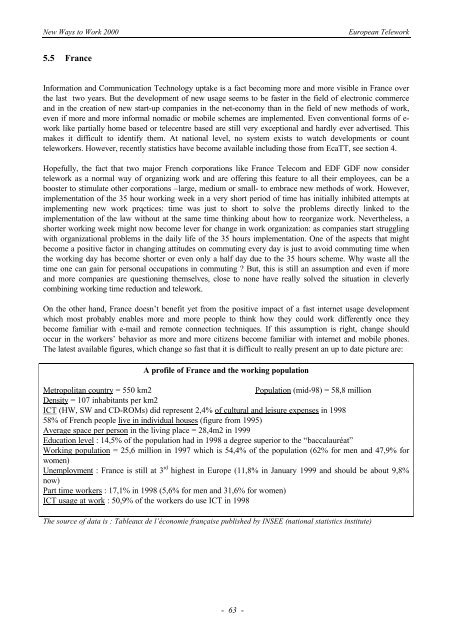eWORK 2000 - European Telework Week
eWORK 2000 - European Telework Week
eWORK 2000 - European Telework Week
- No tags were found...
Create successful ePaper yourself
Turn your PDF publications into a flip-book with our unique Google optimized e-Paper software.
New Ways to Work <strong>2000</strong><strong>European</strong> <strong>Telework</strong>5.5 FranceInformation and Communication Technology uptake is a fact becoming more and more visible in France overthe last two years. But the development of new usage seems to be faster in the field of electronic commerceand in the creation of new start-up companies in the net-economy than in the field of new methods of work,even if more and more informal nomadic or mobile schemes are implemented. Even conventional forms of e-work like partially home based or telecentre based are still very exceptional and hardly ever advertised. Thismakes it difficult to identify them. At national level, no system exists to watch developments or countteleworkers. However, recently statistics have become available including those from EcaTT, see section 4.Hopefully, the fact that two major French corporations like France Telecom and EDF GDF now considertelework as a normal way of organizing work and are offering this feature to all their employees, can be abooster to stimulate other corporations –large, medium or small- to embrace new methods of work. However,implementation of the 35 hour working week in a very short period of time has initially inhibited attempts atimplementing new work prqctices: time was just to short to solve the problems directly linked to theimplementation of the law without at the same time thinking about how to reorganize work. Nevertheless, ashorter working week might now become lever for change in work organization: as companies start strugglingwith organizational problems in the daily life of the 35 hours implementation. One of the aspects that mightbecome a positive factor in changing attitudes on commuting every day is just to avoid commuting time whenthe working day has become shorter or even only a half day due to the 35 hours scheme. Why waste all thetime one can gain for personal occupations in commuting ? But, this is still an assumption and even if moreand more companies are questioning themselves, close to none have really solved the situation in cleverlycombining working time reduction and telework.On the other hand, France doesn’t benefit yet from the positive impact of a fast internet usage developmentwhich most probably enables more and more people to think how they could work differently once theybecome familiar with e-mail and remote connection techniques. If this assumption is right, change shouldoccur in the workers’ behavior as more and more citizens become familiar with internet and mobile phones.The latest available figures, which change so fast that it is difficult to really present an up to date picture are:A profile of France and the working populationMetropolitan country = 550 km2Population (mid-98) = 58,8 millionDensity = 107 inhabitants per km2ICT (HW, SW and CD-ROMs) did represent 2,4% of cultural and leisure expenses in 199858% of French people live in individual houses (figure from 1995)Average space per person in the living place = 28,4m2 in 1999Education level : 14,5% of the population had in 1998 a degree superior to the “baccalauréat”Working population = 25,6 million in 1997 which is 54,4% of the population (62% for men and 47,9% forwomen)Unemployment : France is still at 3 rd highest in Europe (11,8% in January 1999 and should be about 9,8%now)Part time workers : 17,1% in 1998 (5,6% for men and 31,6% for women)ICT usage at work : 50,9% of the workers do use ICT in 1998The source of data is : Tableaux de l’économie française published by INSEE (national statistics institute)- 63 -








